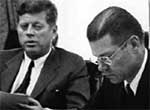Daily Variety
Proof that one must never underestimate another human's capacity to rationalize anything, Errol Morris' "Tabloid" is bonkers in all the best possible ways -- a welcome return to perverse portraiture after a lengthy sojourn in the realm of more serious-minded subjects. With a former beauty queen in the hot seat, the "Fog of War" director applies his trademark truth-seeking methods to his wiliest subject yet: Joyce McKinney, a former Miss Wyoming-turned-Mormon "sex in chains" kidnapper, whose disarming candor masks untold levels of delusion. A ballsy distrib should have a field day marketing this one. (Joyce McKinney press junkets, anyone?) McKinney may have been a favorite punching bag of the Blighty press back in 1978, but it's safe to assume most auds will form their initial impressions based on the slightly dotty, middle-aged woman who appears before them in "Tabloid," first seen in soft-focus beauty-queen mode recording a promotional film for her still-unwritten memoir, "A Very Special Love Story." Though she sold some rights to London's Daily Express at the time, McKinney never got to tell the full story of her involvement in the Kirk Anderson kidnapping.
"Tabloid" reps the next best thing -- better, actually, as Morris' cheeky "as told to" format proves infinitely more entertaining than a straightforward memoir could be. No sooner does the yellow journalism star attempt to clear the record than Morris, seizing upon certain buzzwords in her story, begins to flash screaming 72-point headlines across the screen: Guilt! Spread eagling! Impotence! Rape! (And later, for the biggest laugh in the movie, "Minibar.")
"I can never understand the public's fascination with my lovelife," bemoans McKinney, once a pouty-faced Pia Zadora type, as she spills her story directly into Morris' Interrotron. As a teen, Joyce left the Midwest and moved to Utah, where she fell for Corvette-driving Mormon boy Anderson. Before they could marry, however, the church sent Anderson to London. Rather than lose her "special guy," she flew over, kidnapped Kirk from LDS HQ and drove him to "a romantic moonlit cottage," where she ripped off his "magic underwear" and tried to reverse the brainwashing by tying him to the bed and forcing him "to make love."
Neither Anderson, nor the court, nor any of the other interviewers featured in the doc would agree with McKinney's choice of words (except perhaps her observation that, "You can tell a lie long enough you believe it"). Though Anderson declined to participate, a lecherous former employee, two checkbook journalists (as McKinney calls them) and a former Mormon missionary are happy to weigh in. Morris seems no less skeptical, undermining her story with wonky animated sequences and ironic B-roll from classic TV commercials and the like.
"Do you think a woman can rape a man?" he asks at one point. "I think that's like putting a marshmallow in a parking meter," quips McKinney. The lady may be loopy, but with her quick wit and 168-point IQ, she's never boring. When asked how far she'd go for Anderson, she said, "I would have skied down Mt. Everest nude with a carnation up my nose." Obsession, in other words, doesn't begin to cover it.
In a way, the kidnapping is just the tip of the iceberg with McKinney, and Morris follows her story through her arrest, public humiliation in the press (including a smirk-filled interview with the smarmy Daily Mirror photog who dug up embarrassing evidence from her past) and self-imposed exile, capping it off with a doozy of a twist involving a dog named Booger -- clearly, no soul can escape this woman's love.
For the duration of the interview, McKinney remains good-natured and composed, laughing at the absurdity of it all. Morris has his laughs later, in the editing room, as he assembles the footage into this shamelessly addictive format.
As usual, he punctuates the interviews with jump cuts and blink-long blackouts, allowing John Kusiak's score to position things somewhere between madness and melancholy. After having been exploited most of her life by the media, McKinney clearly knows what she's getting into here; whatever the public decides -- and there will be no shortage of debate after they see the film -- she's lucky to have found a biographer so enamored of her eccentricity.
REVIEWS/ARTICLES
Roger Ebert (S.O.P)
Todd McCarthy (Fog of War)
Fred Kaplan (Fog of War)
Samantha Power (Fog of War)
Ron Rosenbaum (Fog of War)
Peter Applebome (Mr. Death)
Ron Rosenbaum (Mr. Death)
Todd McCarthy (Fast, Cheap & Out of Control)
David Ansen (Fast, Cheap & Out of Control)
Roger Ebert (The Thin Blue Line)
Terrence Rafferty (The Thin Blue Line)
Janet Maslin (Vernon, Florida)
Alan Berger (Gates of Heaven)
Michael Covino (Gates of Heaven)
Roger Ebert (Gates of Heaven)
MORE TABLOID
Watch on Amazon
Facebook Page
OTHER FILMS
Gates of Heaven
Vernon, Florida
The Thin Blue Line
A Brief History of Time
Fast Cheap & Out of Control
Mr. Death
The Fog of War
Standard Operating Procedure
The Unknown Known
The B-Side
Wormwood
American Dharma






